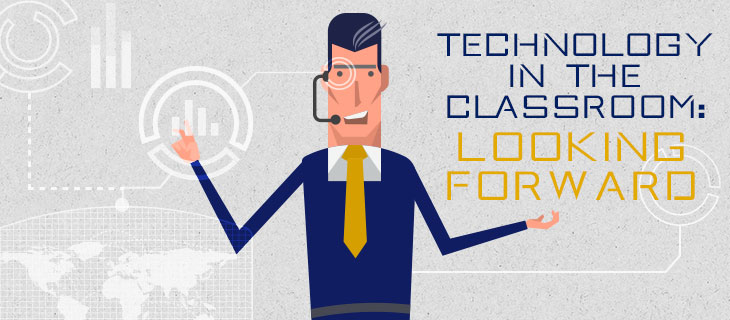
You might think that the classrooms of today are extremely high-tech äóî and they are. Because of the connection between technology and learning, students can submit homework via the cloud, and teachers can deliver lessons on smartboards that record notes and send them to student email addresses automatically. However, the move toward technologically connected classrooms does not stop there. Experts suggest that future classrooms will undergo major changes, even becoming paper free.
As laptops and tablets continue to become cheaper, teachers will be able to deliver exams and handouts in an online format rather than making paper copies. Technology will enable students to carry their work with them in a much more convenient way, possibly eliminating textbooks altogether, along with the heavy backpacks and overflowing lockers that house other traditional education essentials. The following, according to TeachHUB, are just some of the ways future classrooms might transform in response to new technology, creating a new type of learning space for students and teachers.
- All students will have their own tech devices. Whether it is a laptop, e-reader, tablet or some other piece of hardware, the platform on which a student learns will undergo major changes. Instead of several unwieldly textbooks, students will have access to a portable, digitally secure device they can take back and forth between home and school. This will also enable them to keep all of their notes in one place without losing track.
- Classroom interactions will at least partially take place in a digital format. Students will be able to comment and ask questions online, with teachers facilitating discussion and directing the conversations. Everyone in the classroom will be able to communicate with one another online, in the same place.
- Homework will be submitted only online, via school-specific programs or platforms similar to Dropbox. Printing out essays will become a thing of the past. This also means that grades can be posted online as soon as they are determined. They will always be up to date so that students and parents know how they are performing in class.
- Keyboarding will become a requirement in all classrooms. Similar to grammar, every teacher will reinforce typing and tech skills as a way to complete schoolwork successfully. “Keyboarding will be accepted as one of those cross-class academic tools that is important everywhere,” TeachHUB notes.
- Classes will have their own website, wiki or some other type of digital platform on which lessons can take place. These platforms will be able to mimic the daily flow of class, including assignments, resources, class calendars and more. In general, schools will likely have dedicated portals to share information and meet student needs. Classes and schools will be completely connected to social media as well.
- Many aspects of a student’s education will become shareable and collaborative. Whether in the form of shareable screens or publishable coursework, technology will enable students to help each other and learn together. They will learn to reflect on their work and share their learning process.
- Technology will be applied whenever possible, such as when scheduling presentations, reading, fact-checking and more. Teachers will play a particularly important role here, guiding students to think of tech solutions to educational activities and roadblocks.
Ideas about the classroom of the future are always changing. Technological innovation will play a major role in education, both in terms of physical elements like hardware and theoretically in terms of how lessons are taught. Teachers and other education professionals are tasked with keeping abreast of new additions to classroom technology, ensuring changes improve the way students gain knowledge and build valuable skill sets.
Teacher Education at King University
The added credential of graduate study is an effective way for educators to develop a clear understanding of education changes and how to best respond to them. King University’s online Master of Education in Teacher Leaders program provides an in-depth look at modern classrooms, giving teachers the skills they need to lead their peers as mentors and subject matter experts. Discover what King University’s online teacher education program can mean for your career today.